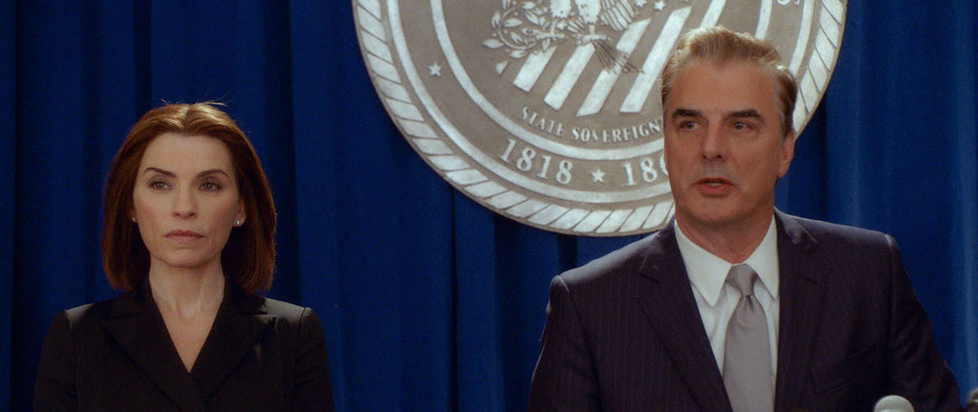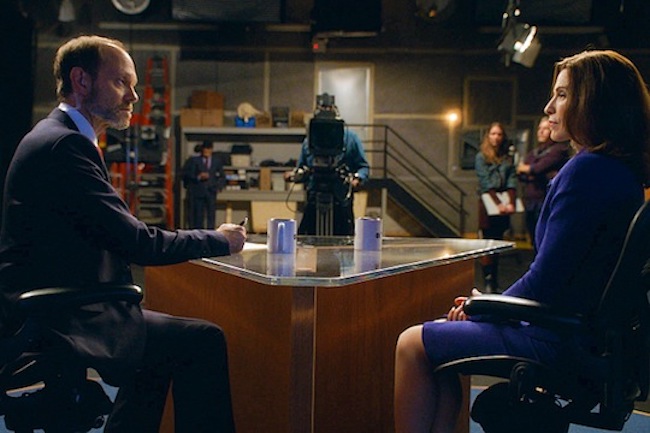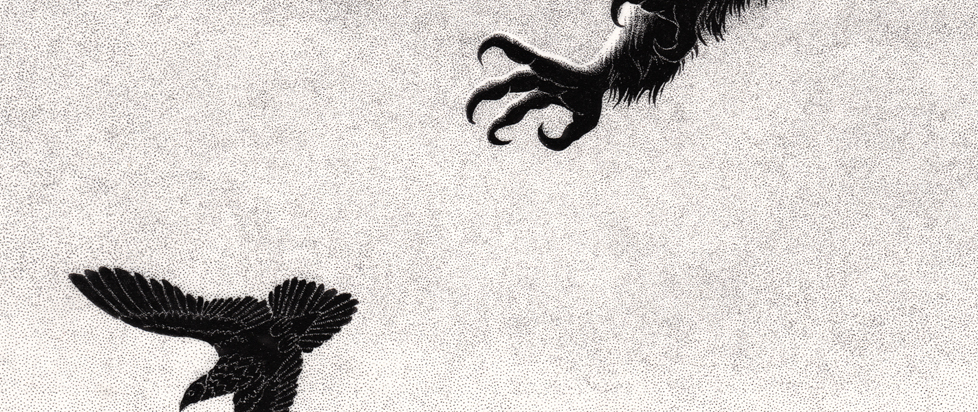
Watching The Good Wife on the Eve of a new Trump Presidency

This column is a reprint from Unwinnable Monthly #182. If you like what you see, grab the magazine for less than ten dollars, or subscribe and get all future magazines for half price.
———
Elsewhere, here.
———
I went into labor the day after Biden dropped out of the presidential race and, amused by the canniness of whomever programs the home page of Max, began a re-watch of VEEP to distract me from the contractions. I finished that show some days or weeks later at six in the night or morning and I stuck with cynicism and politics and re-watched The Good Wife, the CBS political-legal procedural hybrid that ran from 2009-2016. I finished it just about a week after Trump won a second term in office.
In the final season of the series Hillary is still the front-runner in the Democratic primary. When the show ends, the Paramount+ app autoplays the pilot of the spinoff The Good Fight, and in its opening scene Trump is elected president. I keep watching. I’m leaning in.
The Good Wife is not a Trump era show, but it works as well to understand the Biden era as it did to reflect the Obama years – with added hindsight. So many of the issues are the same and have only grown in public awareness: tech surveillance, republican money and racial violence at every level of the legal system. In one episode, our protagonist Alicia Florrick is accused of being a Hamas sympathizer, a line that is played for comedy in the episode but that has pickled into sour irony since actor Julianna Margulies graphically scolded Black and queer people for not supporting Israel.
The show is political in that it is didactic, and it is political as a genre – as a show about politicians – but its politics – that is to say its moral and social stances and questions – come through its case-of-the-week procedural structure much more than the longer arcs rooted in electoral politics. What are the politics of Peter Florrick, the States Attorney and later Governor who is the bad husband to Alicia’s good wife? We know that he is a Democrat. We know he is against assisted suicide and pro-Israel, at least publicly, and that in his run for States Attorney his base is with Black and youth voters, but that when he runs for President his goal is to capture centrists on family values, implying that he’s shifted right of Hillary. That’s about it. Alicia’s politics are similarly undefined, to the point where there is an episode in which her political rival (a touching, uncynical David Hyde Pierce) realizes he doesn’t actually know where their viewpoints converge and differ.

In the weekly cases, however, the political opinions expressed are not only clear but specific. Through these cases the show demonstrates the vast surveillance state of post-9/11 government, the senseless cruelty of mandatory minimum sentences and the legal challenges facing soldiers sexually assaulted during service, amongst seven years of other issues brought to trial. Even when they are presented as two opposing sides that do not come to resolution – as happens with abortion – they come across as two whole opinions presented in tandem rather than a wishy-washy perspective. The show is not liberal or conservative in a way that aligns with electoral politics – red or blue – but it is a show that is interested in morals, ethics and values, and the ways in which they can be represented or protected by the law.
“I like clarity.” Alicia says about the law. “I like rules that tell me what’s right and wrong.” But how can she still harbor those feelings after her own TV show has demonstrated for years that the law is only as moral as the humans writing and enforcing it? It reeks of the Democrats still shouting about how Trump and his cohort is flaunting norms, as if that is not the point. As if what has become normalized under law does not include gross oppression and cruelty.
On The Good Wife, everyone who enters politics becomes corrupt, but so does everyone who practices the law. The character with the most transparent politics – bleeding-heart liberal Diane Lockhart – ends the show under the thumb of two conservative billionaires, one of whom uses her to test-run conservative cases in order to shore up legal weaknesses. This does not mean that law as a concept is a bad one – we should have social and moral codes that we agree to live by – but it shows that counting on norms is meaningless against actors who use the legal stage as a platform to tell stories about unborn children, illegal immigrants and looter mobs. The Democrats are using this last loss as an excuse to retreat center, back to norms, to perceived neutrality, but to give that ground is to have no story to tell at all.
I just watched an episode of The Good Fight where Audra McDonald’s character suggests a strategy against Trump and the Republicans, why not lie? If you can’t get them on the repugnant things they’ve done, why not tell a story about other things that will register more with voters? In story-telling, we find moral clarity at last.
———
Natasha Ochshorn is a PhD Candidate in English at CUNY, writing on fantasy texts and environmental grief. She’s lived in Brooklyn her whole life and makes music as Bunny Petite. Follow her on Instagram and Bluesky.




